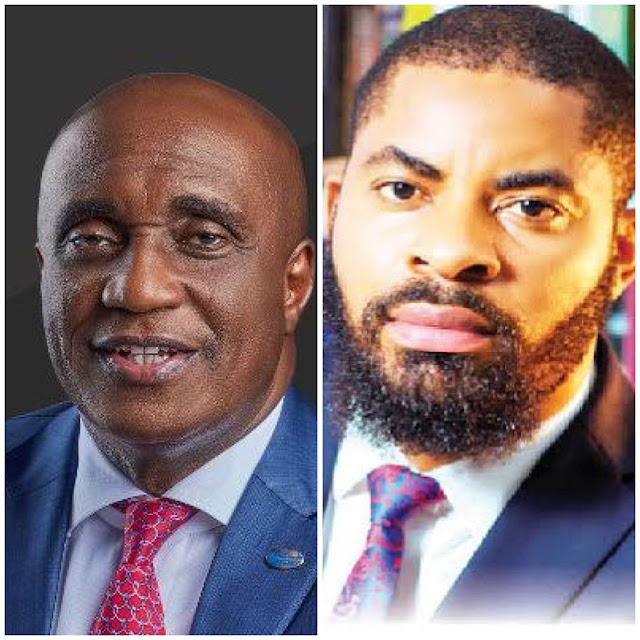Nigerian human rights lawyer and social commentator, Deji Adeyanju, has publicly criticised Port Harcourt-based televangelist, Pastor David Ibiyeomie, for threatening to arrest individuals who report negatively about him. The clash between the outspoken activist and the fiery preacher has stirred public debate about the boundaries of religious authority and freedom of speech.
Pastor Ibiyeomie, founder and senior pastor of Salvation Ministries, delivered a stern warning in a recent viral video where he vowed to take drastic measures against bloggers and media outlets he accuses of misrepresenting his sermons. According to the clergyman, certain individuals—some allegedly embedded within his own congregation—have twisted his words to serve “ulterior motives,” leading to online misinformation.
With unmistakable passion and a sharp tone, the pastor declared his zero-tolerance policy toward such acts. He stated emphatically that he would no longer issue warnings but would instead resort to arresting and detaining those he deems guilty of misrepresentation. In his words, “My type when I go after people, they will now send people to come and beg. So I’m warning you for the last time. Next time, there will be nothing like a warning.”
The cleric went further to assert that no amount of intercession would dissuade him once he decided to act. He claimed to know the identities of those involved, including a young man whose family ties, he alleged, wouldn’t be sufficient to shield him. “Your father won’t beg me, I know your father too. Your mother won’t beg me. I will deal with you,” he warned, without mentioning names.
Challenging what he called the hypocrisy of critics who question his methods, Ibiyeomie remarked that some will be for him while others will oppose him, but he remains unfazed. He scoffed at those who would later condemn him for his actions, stating, “Don’t come back to say this man of God is now using the police to arrest people. I will arrest you. I will lock you up. I don’t care.”
For the cleric, the concern lies not only in the spread of misinformation but in what he describes as a deliberate sabotage of his ministry’s message. He accused rogue elements of lifting quotes from his sermons out of context, thereby fuelling online mischief and public misconception. “They will carry news and incite other bloggers. And some of you in this church are part of it,” he said. “Instead of you listening to the message and getting blessed, you now pick one thing and twist, say what I didn’t say.”
He didn’t shy away from expressing his personal philosophy either. “My gospel is before you slap, I slap you. I am not that kind of pastor. Young man, I will fight you,” he declared, distancing himself from the image of a soft-spoken clergyman.
These comments, however, didn’t sit well with Adeyanju, a prominent voice in Nigeria’s civil rights landscape. Taking to social media, the lawyer expressed dismay at Ibiyeomie’s authoritarian stance, pointing out that even Jesus Christ was not spared criticism during his earthly ministry—yet never resorted to arrests or threats.
Adeyanju accused the preacher of behaving in a manner unworthy of spiritual leadership, suggesting that his threats undermine the very teachings he claims to uphold. “People criticised Jesus and he never attempted to lock anyone up,” Adeyanju remarked pointedly. “This kind of intimidation only shows insecurity and abuse of influence. No one should be above scrutiny, especially those who preach to millions.”
The activist further noted that in a democratic society, clergymen, like all public figures, are not immune to critique, especially when their sermons are broadcast to a global audience. He stressed the importance of accountability, arguing that the pulpit should never be used as a shield from public opinion or legal challenge.
Debates are now mounting around the broader implications of Ibiyeomie’s remarks. Some observers see it as an alarming attempt to silence dissent, while others defend the pastor’s right to protect his image from defamation. Legal analysts warn that such threats could escalate into civil liberties concerns if acted upon indiscriminately.
As the controversy unfolds, questions linger over how religious figures wield their influence in a media-driven age and whether lines are being blurred between spiritual leadership and personal vendetta. Whether Ibiyeomie will follow through on his warning or temper his stance remains to be seen—but for now, his comments have sparked a nationwide conversation that is unlikely to quiet down soon.













![Content Creator Angelica Kelechi Speaks Out on Alleged Sexual Assault at Khloe Abiri’s Spa [VIDEO]](https://blogger.googleusercontent.com/img/b/R29vZ2xl/AVvXsEgQStip4cn2DAOvQ2hNFU30OAFWoxfQIDOnStd0uVgwwxKrFAQYYvtFni6QV04OGP8dyKk5TCAhXM5es9linl1ClhjPzaazz2tTt0LmJ5lFVe5202o2McF9QROT1v2hEyNTdY-M1KRuLTY6OqqysKNfcsY5bCtwCIP8wEQ4AXcfQfTaXWWZiixqf82NDH5a/w72-h72-p-k-no-nu/abiri-khloe123.jpg)

![Bello El-Rufai Questions Discrepancy As Boko Haram Terrorist Gets 20Years While Nnamdi Kanu Receives Life Sentence [VIDEO]](https://blogger.googleusercontent.com/img/b/R29vZ2xl/AVvXsEiWSu8zIQCe1XyQUKpvkUYY03fJRFWUlJkrlvEZioStBVV0gT0uVjMg64uBqblrA0aTyaQ4RD8mhelxNq7VGPBtsNFzDl9sS880MvdKXa2d964PDDf9atDRlVMzCw2qE7vtqGj1NNyq2IVC6d3c4qqdeGP6QgwPUInkpB3rWonFU75SMJfs-ql5uH7IzchQ/w72-h72-p-k-no-nu/Bello-El-rufai1123.jpg)




0 Comments
Hey there! We love hearing from you. Feel free to share your thoughts, ask questions, or add to the conversation. Just keep it respectful, relevant, and free from spam. Let’s keep this space welcoming for everyone. Thanks for being part of the discussion! 😊